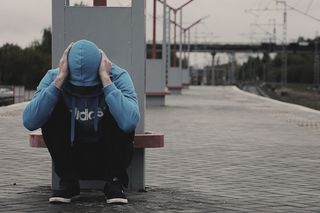Dreaming
Gone Man
"Getting clean for me was a life-and-death matter."
Posted October 16, 2019 Reviewed by Devon Frye

James B. is a co-author of my book The Craving Brain: Science, Spirituality, and the Road to Recovery. Here, he shares an important moment in his recovery process:
The man staring back at me from the mirror was a shell of a man, a hollowed-out stranger. His eyes were sunken, his face thin, and his arms had lost their muscle tone.
I had been trying to get clean for almost a year, and it wasn’t working. After going to Alcoholics Anonymous for several months, I had been able to quit drinking, but I had not been able to stop using cocaine.
It was my worst nightmare. Off and on for several years, I had tried to get clean by going to counseling or just gutting it out. Once, I even tried hypnosis. Nothing had worked, but then I hadn’t really wanted to stop either. At the time I had assumed that if I really wanted to quit, I could.
Now, although I still didn’t want to give up my drugs, I had accepted that I was an addict and that getting clean for me was a life-and-death matter. With a sense of desperate urgency, I was trying to stop, yet here I was, months later, still using.
At first, I had attended only meetings of Alcoholics Anonymous. The junkies in Narcotics Anonymous had seemed too hardcore for me—some were homeless and a lot had serious criminal records—and they were not people whose circle I wanted to join. But when the alcohol-focused approach of AA failed, as a last resort I went to an NA meeting. To my surprise, I had more in common with people there than I thought, and at least for that one hour, I could stop obsessing about my drugs.
I kept going back to NA and left every meeting determined to go home and flush my remaining cocaine down the toilet. Within minutes of walking in the door, I was using again and had to keep using until my money ran out.
By now, my body was rejecting cocaine like a toxic allergen; I would feel clammy and paranoid, as if every cell was on high alert. This intense misery, without even a moment of pleasure, lasted for as long as I was awake, which could be for two or three days. When I crashed, I had to sleep for days. Worst of all, I knew that all my suffering was self-inflicted—and I could do nothing to stop it.
A Fortunate Accident
One day, when I was trying to find my way to an AA meeting, I accidentally walked into a Nar-Anon meeting—for the family members of drug addicts. By the time I realized my mistake, it was too late to leave.
As I sat listening to people talk about the terrible pain of living with an addict, for the first time I began to wonder how my addiction had affected the other people in my life. My parents and my girlfriends had mostly seemed like irritating obstacles to my party life. Was it possible that I had broken their hearts and crushed their dreams? Just the thought felt like a kick in the gut, and a layer of my denial was peeled away.
The only happy part of my life had been a new part-time job at a radio station. It began as an unpaid internship, and my hope had been that if I did well, they would hire me as a sports broadcaster. The job was a good fit for my interests and talents, and for the first time in years, I had worked hard to achieve a personal dream. My efforts had paid off, and the station manager had offered me a broadcasting job. Because the work was challenging and came with prestige and a public profile, I had recovered some of my lost self-esteem.
I was determined not to screw up, which meant concealing my addiction at any cost. Unfortunately, deception had become harder than ever because my craving had grown more out of control, and my binges were only days apart. I needed more time to recover, physically and mentally, and I was still working a second job—at a bar—so that I could pay my bills and buy drugs. The effort to juggle everything had left me in a state of permanent exhaustion.
My downfall came with an important assignment at the radio station—the opportunity to interview a famous college football coach as he came off the bus with his team for a big game. The night before, I hadn’t been able to stop using cocaine, and in the morning I hadn’t been able to quit long enough to walk out the door. By that afternoon, my boss, a really good man, had fired me from my dream job.
It had been shattering. The last layers of my denial had disappeared, and I knew that just trying harder wouldn’t work. Once and for all, I had ruined my life. In a last-ditch effort to save myself, I had checked into a county outpatient treatment program, but I had only been able to stay clean for fifteen days.
Now, looking at the addict in the mirror, I could see that decision time had come. I had no job and no paycheck coming in. My girlfriend was long gone. My rent was three months late, and I was about to be evicted. My parents wouldn’t help me, and my last friend in the world had just supplied me with drugs because I had begged him until he acquiesced. I was down to my last $25, with no furniture or electronics left to pawn.
In a matter of days, I would be homeless and on the street, with drug dealers looking for me. I was still buying cocaine in bulk “to sell to friends” and then using most of it myself. My dealers had advanced me more than $1,500 in drugs, and it was time to pay up.
My world was closing in around me, and except for resorting to crime or prostitution, I was out of options. With nowhere else to turn, I decided to go to an NA meeting. Being around other addicts would give me a sixty-minute break from obsessing about drugs, and maybe, just maybe, I’d think of a plan.




